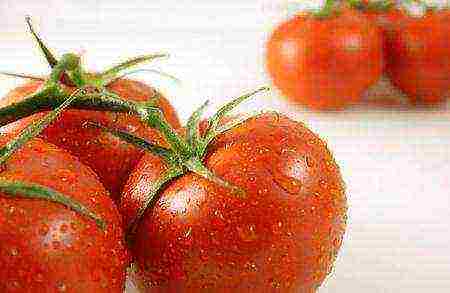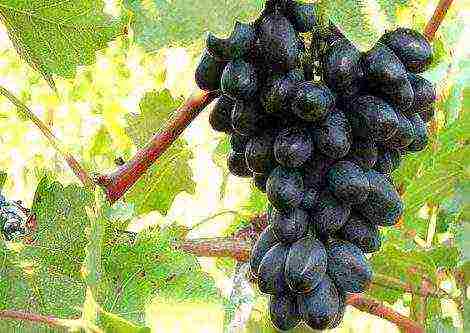Content
- 1 Early varieties of eggplant
- 2 Mid-season varieties
- 3 Eggplant varieties for greenhouses
- 4 Open ground varieties
- 5 The best multi-colored varieties
- 6 The best purple varieties
- 7 The best varieties for the Moscow region
- 8 Multicolored eggplant in the garden
- 9 Early ripe eggplant
- 10 Always with a splendid harvest - fruitful varieties
- 11 Cold-resistant varieties
- 12 Small spool, but expensive - undersized eggplants
- 13 Overview of regional varieties
- 14 Reviews of summer residents
- 15 Eggplant: varieties, photos, description
- 16 Eggplant Black handsome, reviews, photos
Choosing the best for your garden, you automatically choose not only the quality of vegetables, excellent characteristics and taste, but also give yourself the opportunity to use a minimum of labor costs. Eggplant is a vegetable among the varieties of which any gourmet can find to his liking, and no matter what size, color, yield you prefer, there is plenty to choose from. Let's take a look at the best ones.
Early varieties of eggplant
Early eggplants are good not only for the quick ripening of long-awaited vegetables, but also for the opportunity to get a full harvest in the northern regions. If in May you do not have the opportunity to plant eggplants in the ground, and in June night frosts are possible, it is worth choosing early varieties for your garden. Choose hybrids for your garden that have proven themselves among farmers and gardeners.
King of the north
Hybrid with high resistance to frost, subject to hardening of young shoots. Ripeness occurs at 90 - 100 days, but many note that in 70 - 80 days, the fruits can already be fully formed.
From one plant it is possible to remove from 3 to 4 kg of even purple cylinders.
The taste is quite delicate, a small amount of voids even at maximum maturation. Stored at a temperature of 12 - 15 degrees for up to two months, ideal for preparing blanks.
Bibo
This is a white-skinned eggplant with super early ripening. After 60 - 70 days, you will remove up to 15 even and smooth snow-white vegetables weighing up to 500 g from one bush. It is unpretentious, and perfectly pollinates and matures both in the greenhouse and in the ground.
Black handsome
The black handsome variety has an ideal dark shade, the fruits are small, up to 200g, but up to 3 kg can be removed from one root. After 70 - 80 days, it gives a friendly harvest, but it is worth protecting from the first frosts, it requires additional shelter.
Mid-season varieties
These eggplants are best used in regions where there are no unexpected frosts, or grown in a greenhouse. Due to the longer ripening period than in early ripening ones, you should carefully monitor the temperature in the greenhouse. The more stable the temperature and humidity, the richer the crop will be.
Albatross
If you like teardrop-shaped eggplants, round, fleshy, without voids, then this is your option. A variety for fresh consumption, conservation and long-term storage. Easy to transport, has a high keeping quality, this has become the main reason for choosing among farmers.
Diamond
One of the most favorite eggplant of gardeners in the middle lane. It is considered a dwarf bush, but very branchy, formed in the form of a ball. Decorative. Aging period up to 80 days.You can get up to 8 kg from one bush. Fruit weight up to 180g. The formation of flowers occurs from June to August, and the fruiting in this regard is long.
Marzipan
Connoisseurs of the delicate and tasty pulp of this eggplant prefer it not only for this reason. Ripens in 110 - 120 days, has a beautiful pear-shaped shape, deep purple hue.
Eggplant varieties for greenhouses
High-yielding varieties grow well in greenhouses, they require care, but respond to it with amicable and good fruiting. Stable temperature and humidity allow you to choose tall plants - from each such bush, you can remove from 5 to 12 kg of vegetables.
Robin the Hood
A mid-season hybrid, requires the formation of a bush, but has a low growth of up to 60 cm. The plant has thorns. Pear-shaped, rounded fruits with low bitterness, ripening at 90 days. Medium keeping quality, for all types of canning and cooking.
 Description of the variety Robin Hood
Description of the variety Robin Hood
Policeman
Tall, up to 240 - 260 cm, ripens up to 120 days from the time of planting. Fruits ranging in size from 20 to 35 cm, yield - up to 9 kg. Requires the formation of a bush, it is enough to leave 2 stems, on which up to 15 fruits ripen at the same time.
Excellent taste for both fresh and salted consumption.
It can be stored fresh for up to 2.5 months, loses its presentation a little, dries out, but the taste remains.
Sophia
A late-ripening variety with large fruits. Ripe fruits reach 30 cm and weigh up to 900g. The bush is up to 150 cm high, forms itself, but pinching is required. Up to 17 kg can be removed from one plant. very dense purple fruits. Perfectly stored and transported, the shelf life is the highest among all varieties with such a productivity - up to 3 months.
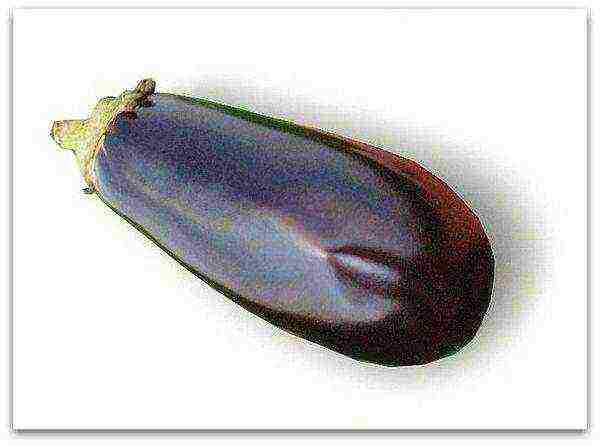 Eggplant Sophia
Eggplant Sophia
Open ground varieties
If you plan to grow your eggplant outdoors, suitable frost-resistant varieties are essential. In the middle lane, even the most patient vegetable to temperature changes requires shelter for the period of night frosts. Only zoned hybrids are ideal for a greenhouse.
Vakula
Patient enough to temperature changes, you can plant seedlings at the end of May. Height up to 120 cm, has a strong and dense stem. Pinching is not required, the bush forms itself. Up to 8 kg of eggplant can be removed from one bush.
Bull heart
Does not tolerate spring frosts, therefore, plant in open ground after their end. Rounded fruits weighing up to 300 g., Bush up to 80 cm., Yield about 8 - 12 kg. Unpretentious in agricultural technology, but does not tolerate overflow.
Alekseevsky
One of the best outdoors. The height of the bush is up to 70 cm, very branchy, fruits up to 150g, but in one season it is realistic to collect up to 9-10 kg. A garter is required, as the bush is very fragile.
The best multi-colored varieties
White-skinned varieties were bred in order to get rid of the bitterness, which is contained precisely in the coloring enzyme. Eggplants of other colors were obtained by crossing.
Swan
One of the best white eggplants. It has not only white skin, but also flesh. Can be grown both in soil and in a greenhouse. The height of the bush is up to 70 cm., The weight of the fruit is up to 250 g. The yield of one plant is up to 6 kg.
Icicle
Unusual due to its shape, which is why it is attractive. Bush up to 80cm. Fruits up to 300g. Up to 5 kg can be removed from one bush.
Flamingo
The name speaks for itself - beautiful pink, curved fruits weighing up to 40hg. They are in time for 130 days. Shrub up to 180cm, spreading and high-yielding. Up to 16 kg can be harvested from one plant.
Purple Haze
Dark pink fruits weighing up to 180 g, ripen, on average, in 120 - 130 days. Bush up to 150cm, branched. It is afraid of frost, in a greenhouse up to 5 kg can be removed from one plant.
Yoga
Unusually - green fruits, reminiscent of curled corn. Each weighing up to 250g., Up to 20cm long. The bush is up to 80 cm, semi-spreading, does not require formation. The pulp and rind have no bitterness.
Emerald
Bright green fruits weighing up to 300 g., Ripen on average up to 100 days. The plant tolerates temperature extremes and mild drought. From one root in 120 days, you can get up to 5 kg of vegetables.
Chinese lantern
In 80 - 110 days after sowing, at 70 cm, unusual eggplants begin to turn red in the bush. Unusual bright color and shape makes them look like decoration. Weight up to 180g, yield - up to 3 kg per plant.
The best purple varieties
Even the fact that new bright colors of the vegetable with low bitterness appeared did not distract from the standard purple favorites. Among them, the leading varieties are:
King of the north
Resistant to frost, technical ripeness for 90 - 100 days, but can be removed for 70 - 80 days. Up to 4 kg of even purple, very beautiful fruits are removed from the bush.
Purple miracle
Hybrid. It tolerates drought patiently, but it is necessary to use a lot of water one time. The bush is up to 90 cm high. Beautiful elongated fruits weighing up to 250g. Maturation at 90 - 115 days. From one plant, you can get up to 8 kg of eggplant.
 Purple miracle
Purple miracle
Diamond
Dwarf variety. Height up to 50 cm, but the bush is very branched. It looks very decorative, in the form of a ball, does not require shaping. Ripeness for 80 days. Fruits up to 180 - 200g.
During the season, you can get up to 8 kg of beautiful bright purple fruits.
The best varieties for the Moscow region
The middle lane is a fairly mild climatic zone, but late summer and early autumn do not allow late-ripening varieties to fully ripen. Greenhouses help with this, but it is still worth choosing early and mid-season varieties.
These varieties will give an excellent harvest and bring a minimum of hassle:
- King of the north. Will give an excellent harvest in the absence of frost in early summer. It proved to be excellent both in greenhouses and in the ground;
- Black Prince. It is worth choosing it not only because of its decorative effect. The rich purple color hides the tender pulp without bitterness, and from one bush it is possible to get fruits up to 8 kg.;
- Sophia. Even when planting in the ground, and covering in the first week, you will receive up to 15 - 17 kg of large, up to 900g per season. Eggplant.
- Albatross. Mid-season, but ripening early enough. On day 90, the first fruits can be removed. Beautiful cylindrical shape and delicate taste. Patient about drought;
If you dream of a friendly and high harvest, minimal labor costs and pleasing to the eye vegetables, you should choose seeds zoned for your area, provide proper care, and do what you love with pleasure.
This vegetable grows wild as a herbaceous perennial in India and the Middle East. Participants in the campaigns of Alexander the Great met him back in the 4th century BC. Eggplants appeared in our area in the 17th century, and since then these thermophilic representatives of the Solanaceae family have taken root in the southern regions. They are grown as an annual, considered a vegetable, although, according to science, its fruit is a berry, and is affectionately called "blue". By the way, the last definition today is not entirely accurate, since now white, green, red, black, yellow, lilac and even striped varieties of eggplants are bred.
Multicolored eggplant in the garden
Eggplant, as a southerner by origin, is a rather demanding culture in terms of agricultural technology and weather conditions. However, today the list of its varieties is so wide that you can always choose the most suitable one that best suits the needs of the gardener. From the ripe fruits of all varietal eggplants, seeds can be collected for sowing next year. The exception is hybrids. Vegetables grown from their seeds give splitting parental qualities rather than replicating the parent plant.
In the article, mainly selected for the description of the variety, which the FSBI "State Variety Commission" included in the State Register of Breeding Achievements, approved for use in the regions of Russia. Varieties that are not included in this list are marked with an asterisk (*) in the text, their description is given according to information from available sources.They are included in the article, as they have characteristics that correspond to a particular section.
The Almaz variety, a mid-season eggplant that grows in Ukraine, Moldova and Russia, has been very popular for many years. It has been included in the State Register since 1983. In these regions, 110–150 days pass from the first shoots to the harvest of ripe fruits. The plant is resistant to diseases such as tobacco and cucumber mosaic, columnar, wilting. The diamond has no thorns. Almost black fruits grow on low bushes, just over half a meter. No more than six seedlings are planted on one square meter, but up to 8.8 kg of harvest is harvested from them.
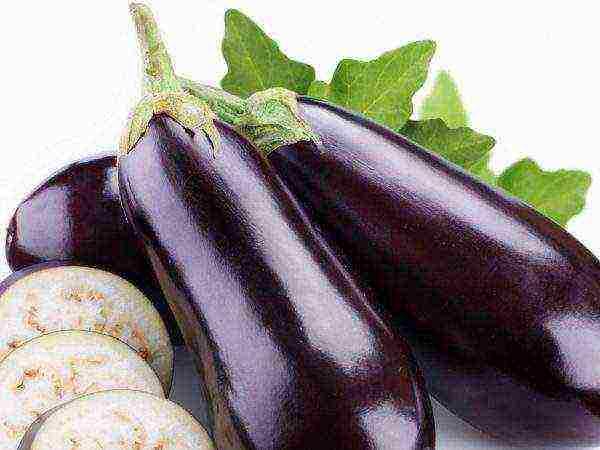
The Almaz eggplant variety is one of the most beloved by gardeners
Banana eggplants are shaped like the tropical fruit that gave them its name. These purple bananas grow on compact and low, up to 40 centimeters bushes. Their strong stems do not require support and perfectly hold numerous fruits. There is no bitterness in eggplants, they can be cut into salads raw, fried and used in home canning.
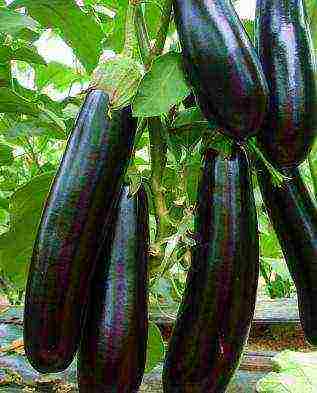
Banana eggplants are ultra-ripe
Important characteristics of the mid-season Albatross variety are:
- fast germination of its seeds;
- high resistance to most diseases;
- excellent yield up to 6–8 kg per square meter of the garden;
- fruits can be harvested 135 days after the first shoots.
Plants growing up to 70 cm will be comfortable if they are planted no more than four per square meter.
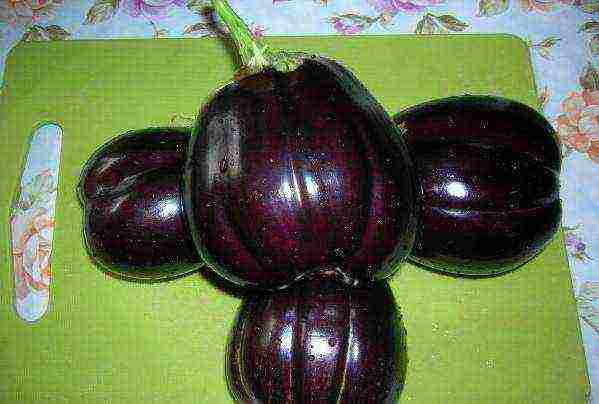
Albatross eggplants are disease resistant
Eggplant fruits Graffiti as if painted by someone. Hence the name. They have an average ripening period of 115–120 days. During this time, the fruits can weigh up to 400 grams. Bushes grow no more than 65 cm. Graffiti is resistant to diseases. Eggplants have a thin skin and medium-sized seeds, the snow-white pulp is not bitter. The vegetable can be used to prepare any kind of food.

Graffiti eggplant fruits are distinguished by their delicate sweet pulp.
Mid-ripening eggplants White Night grow on spreading bushes up to 70 cm high. Fruits reach ripeness in 105–115 days and weigh up to 220 g, and up to 6 kg of harvest is removed from a square meter of a bed. The pleasant taste of this type of eggplant has no bitterness and is especially appreciated by culinary experts.
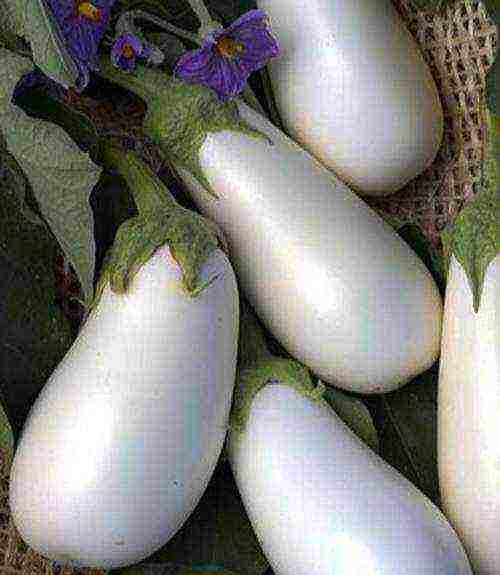
Eggplant varieties White Night reduce cholesterol and remove excess fluid from the body
Eggplants of the Astrakom variety are distinguished by high yield, mid-season. Dense fruits, covered with black skin, ripen in 118-125 days, if you count from seedlings. Eggplants have excellent taste and are suitable for preservation. Astrakom is not susceptible to such common diseases as late blight and anthracosis.
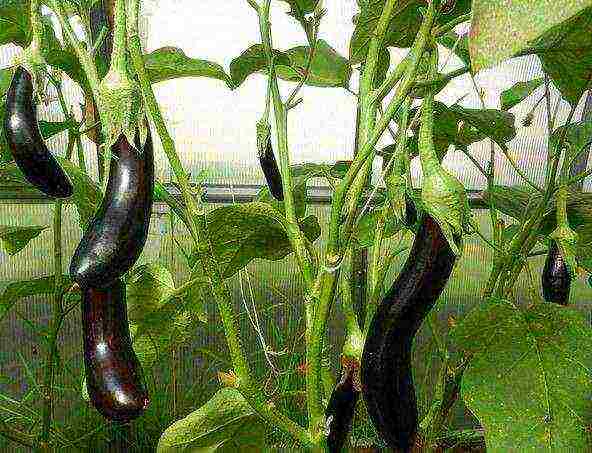
Astrakom is a high-yielding eggplant variety.
Eggplant Lavender Rome * - a kind of Italian Rotonda Bianca - belongs to the middle early. It only differs from its predecessor in the larger size of fruits (500-600 g, and some up to 1 kg) and more tender, without bitterness, pulp, which, moreover, does not darken. Sprawling bushes grow up to 70 cm. The variety is characterized by abundance and duration of fruiting.
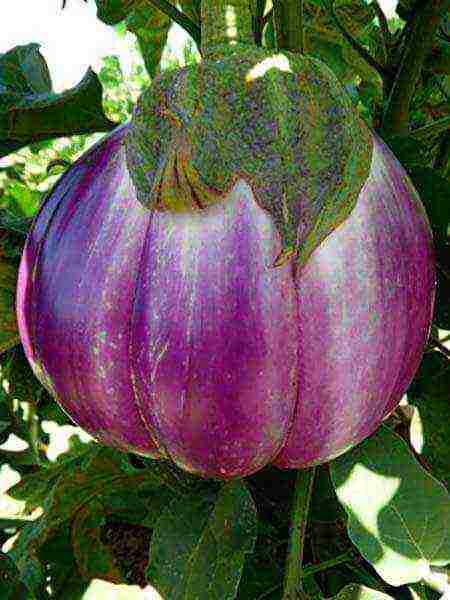
Eggplant variety Lavender Rome has very large fruits
Bourgeois is one of the early ripening hybrid varieties of eggplant. Round black-purple fruits of this variety can weigh up to 300 grams. Bourgeois is not recommended to be planted in greenhouses, because its height can reach 1.6 meters. Such a giant needs a trellis garter. In addition, the bushes of this variety are spreading, no more than three plants are planted per 1 m2 of beds.
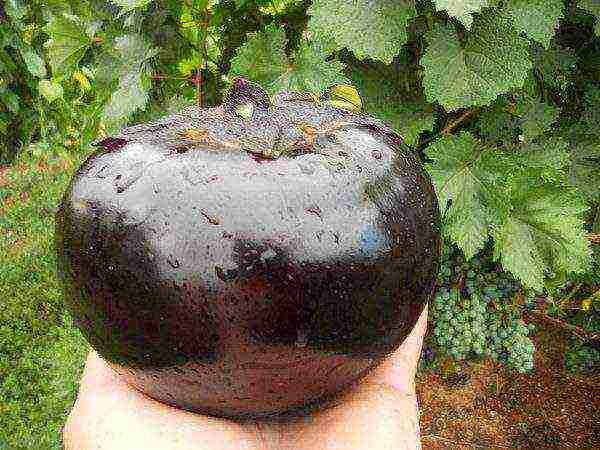
Eggplant variety Bourgeois - one of the early ripening hybrid varieties
Variety Japanese dwarf is one of a number of frost-resistant varieties approved for cultivation in all regions. Why it is called Japanese is not clear, and its fruits are not dwarf at all - up to 170 g. True, the eggplant bush is compact and low - up to 45 cm. It was bred specifically for growing in open areas. Seven bushes can grow on 1 m2 of the garden.The variety has excellent early maturity - from the moment of sowing seeds for growing seedlings to harvesting fruits, it takes three and a half to four months. Thin skin of the fruit and tender pulp without bitterness are also among the advantages of the variety.
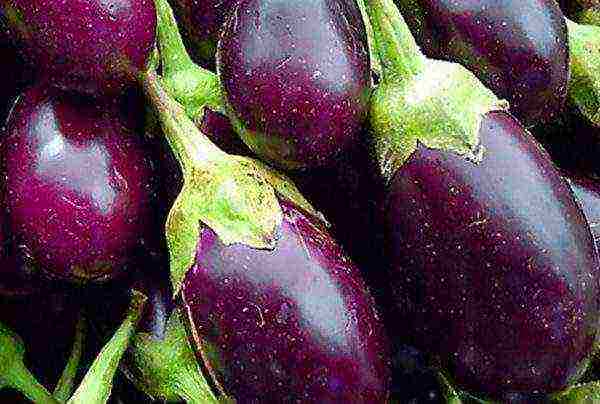
Thin skin of the fruit and delicate taste are the advantages of the eggplant variety Japanese dwarf
In the genus of eggplants there are varieties so unusual and beautiful in appearance that they simply become an adornment of any garden bed. Some are grown for consumption and are listed as common agricultural plants. Others are planted just for beauty. After all, eggplants become the most expressive and decorative when they are fully ripe, but then they begin to taste very bitter and irritate eaters with their large seeds.
Photo gallery: eggplant decorating the site
Early ripe eggplant
The varieties of early ripening include those eggplants in which a little more than three months pass from the germination of seeds and planting them on seedlings until the first harvest.... That is, if blue seedlings are sown, as a rule, in late February - early March, then the first crop can be removed by mid-June. Producers with such qualities are announcing a number of eggplant varieties.
Domestic selection of eggplants The taste of mushrooms is really early maturing. The crop can be cut in 3–3.5 months after the first shoots. You can grow them in open beds. The name of the variety of these milky white vegetables really reflects the taste of their pulp. Although some argue that it resembles chicken. With proper care, more than 6 kg of fruit can be obtained from 1 m2 of a garden bed.
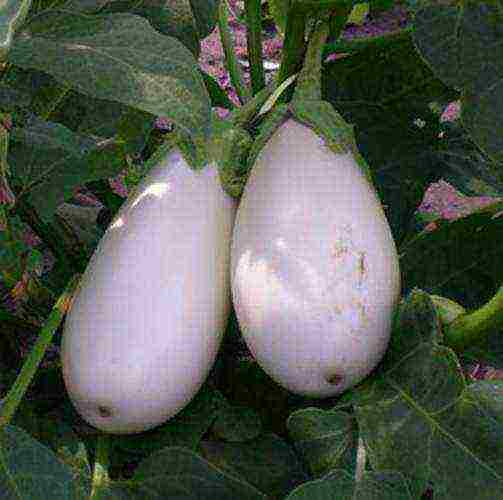
Eggplant of the Mushroom Taste variety really has a mushroom flavor
Just fifteen days longer than the Mushroom Taste harvest, you will have to wait for the first eggplant harvest of the original Icicle variety. Its snow-white fruits grow on spreading, not very tall bushes (60–70 cm) in 110–116 days. They really look like ice icicles in shape. Fruits weigh up to 150 grams. The eggplant taste is very pleasant, has absolutely no bitterness. Use the Icicle to prepare a wide variety of dishes.
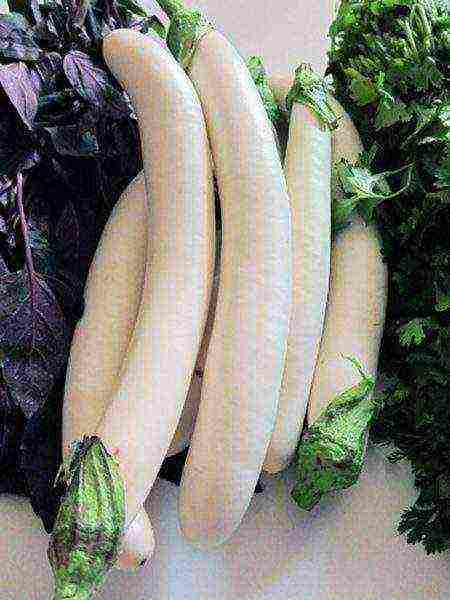
Icicle eggplants have tender juicy flesh
In the North Caucasus and the Lower Volga region, as well as in Ukraine, Moldova, the Alekseevsky eggplant variety is recommended for growing in open beds... They have a pleasant taste, no bitterness, and a high yield. The first harvest can be expected as early as 98–132 days. Eggplants weighing from 100 to 190 grams grow on several spreading bushes that grow up to 70 cm. Yields from 1 m2 - up to 7 kg. It can be transported over long distances without losing the quality of the fruit.

Alekseevsky eggplants have a pleasant taste without bitterness and a high yield
Quartet eggplants with yellowish and purple stripes on the fruit are popular due to their resistance to drought and bacterial rot. Fruit of commercial quality can be harvested 107-122 days after sowing seedlings. Their weight is up to 125 g. The bushes are low up to 60 cm.

Eggplant variety Quartet is drought and rot resistant
Variety Lilac fog is recommended for cultivation for all regions of Russia. Its low, up to 60 cm bushes give fruits weighing up to 200 g. The inner eggplant pulp is white. It has no bitter taste. Eggplants of this variety are immune to diseases such as apical rot.
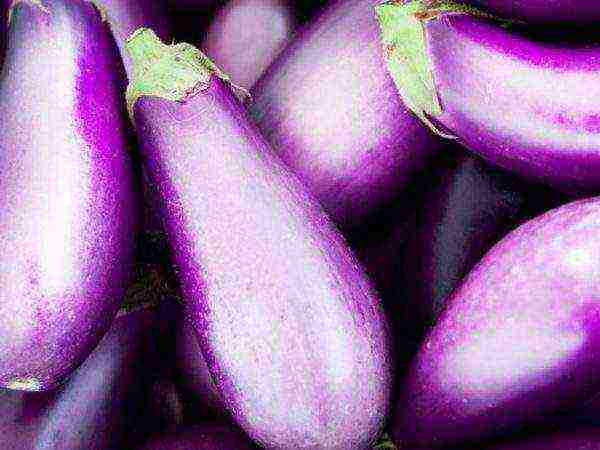
Eggplant variety Lilac fog is not afraid of diseases
Always with a splendid harvest - fruitful varieties
Everyone who works on the land wants to see the embodiment of their work in the form of a bountiful harvest. Therefore, varieties that are known to consistently produce a large number of high-quality fruits are very popular. Some of them are very popular among Russian gardeners and have many positive reviews. They do not hesitate to include the varieties Almaz and Alekseevsky already described here earlier.But there are other, practically not inferior to them in terms of yield, eggplant varieties included in the State Register.
Black handsome - this variety of eggplants has an average ripening period and is not inferior in yield to Almaz. The plant is unpretentious and excellent disease resistant. At an average height of the bushes - 60–80 cm - numerous fruits weighing up to 200 grams grow, which ripen together in 110–145 days. Their tender, yellowish flesh is bitter-free and contains very few seeds.

Eggplant variety Black handsome in yield is not inferior to the Almaz variety
The Robin Hood eggplant variety has gained popularity among vegetable growers for its stable yield and extraordinary resistance to negative growing conditions. On its sprawling bushes, 70–100 cm high, quite a lot of fruits are tied, which, when ripe, weigh up to 300 grams. The Robin Hood variety has a lilac color of fruits, which are good salted or fermented, which distinguishes them from many relatives.
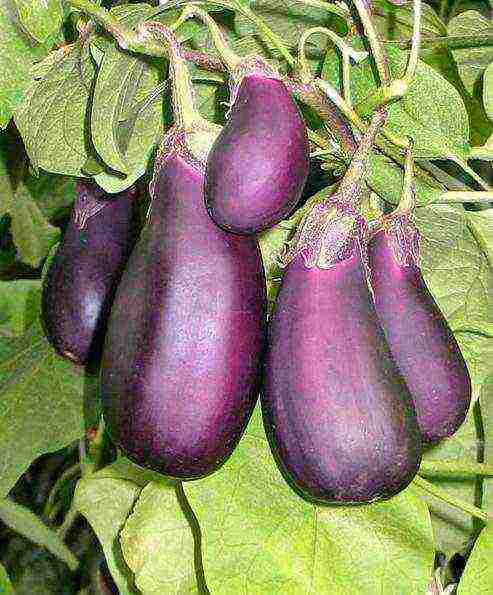
Robin Hood eggplant variety is resistant to the vagaries of the weather and consistently yields
Speaking of fruitful eggplants, one cannot fail to mention the Epic hybrid variety. This hybrid, both in appearance and taste, is grown all over Russia. Powerful Epica bushes, reaching a height of 100 cm, bear fruit within 65 days after planting in the garden. The weight of each eggplant can be up to 230 grams, and the yield from 1 m2 of the garden is 5.8 kg. Epic is resistant to all the most common plant diseases of this species.
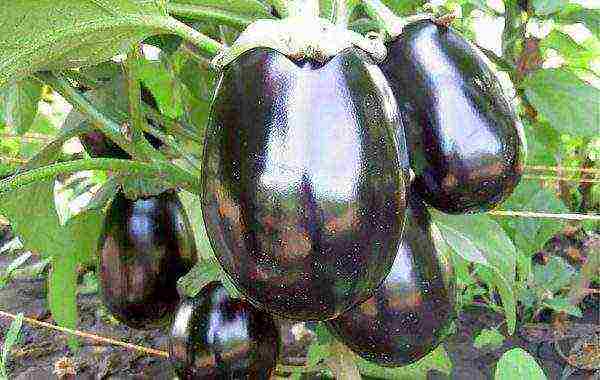
Epic eggplant variety is powerful and disease resistant
Cold-resistant varieties
In a climate unusual for eggplants with a short summer, it is recommended to plant varieties with the shortest ripening period in the ground. Almost all of them are hybrids. Among them is the hybrid variety Bourgeois described above. The hybrid variety King of the North F1 * tolerates the cold better than other eggplants.

Eggplant variety King of the North tolerates low temperatures well
The period of fruit ripening is very short - up to 100 days from full sprouting of seedlings. At the same time, up to 12-15 kilograms of eggplants are removed from 1 m2.
The same group of early-ripening eggplants includes Variety Valentine. A plant with spreading bushes produces dark fruits weighing up to 220 grams within three months after germination. Up to three kilograms of eggplants are obtained from a unit area. The fruits are not bitter, very tasty, suitable for cooking and canning. Moreover, the plant is resistant to many diseases, including the tobacco mosaic virus.
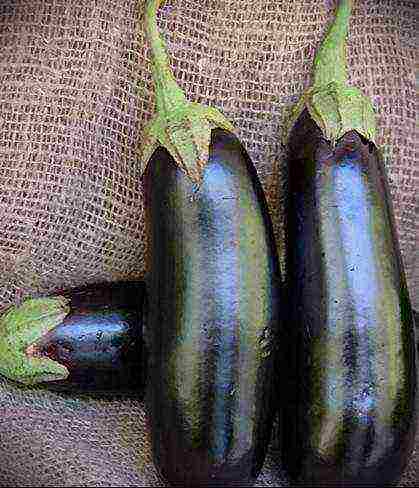
The Valentina eggplant variety has a mild flavor.
Dense bushes of the Vera eggplant variety are no higher than 80 cm and yield a harvest for 110-115 days. The weight of the fruit is about 300 g. The Vera variety eggplants are resistant to significant temperature changes and rot diseases, and are suitable for long-term storage. Harvest - up to 2.9 kg per unit area.

The fruits of Vera eggplants are kept fresh for a long time.
Bibo is also a hybrid variety that produces many fruits weighing up to 0.5 kg. The crop ripens quickly in August-September. Bibo is recommended for growing in open beds in the southern regions. No more than 6 bushes are placed per 1 m2, otherwise the harvest may not wait at all. Experienced gardeners do not dive seedlings of this variety in order to accelerate fruiting.
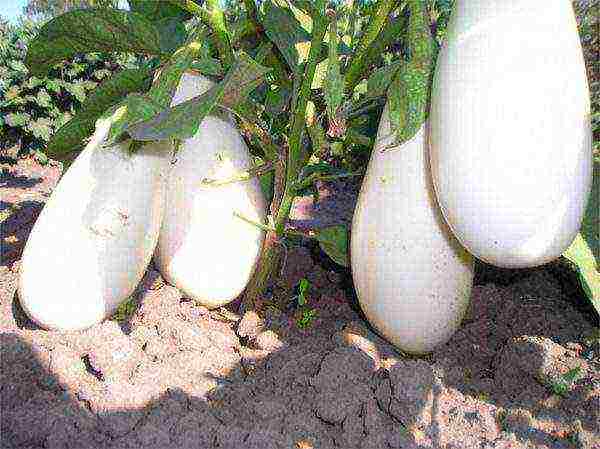
Bibo eggplants have an accelerated growth
Small spool, but expensive - undersized eggplants
When growing eggplant, gardeners are sometimes guided by varieties, the height of the bushes of which is small. This allows you to grow a vegetable without additional supports and time-consuming tying up the branches of the plant. These include the previously mentioned varieties Almaz, Robin Hood, Bourgeois, Albatross, Alekseevsky. To this list should be added the hybrid varieties Black Moon and Bull's Heart.
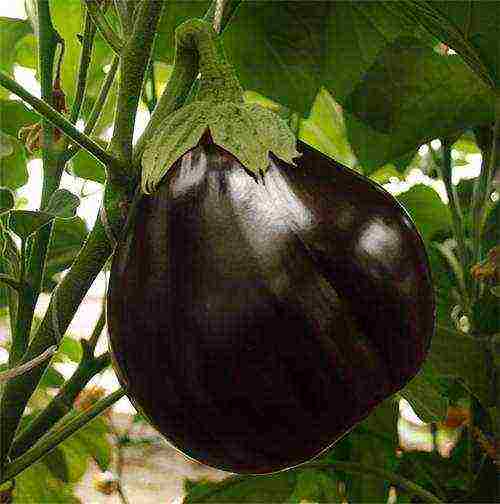
Eggplant varieties Black Moon do not like picking seedlings and thickened planting
Black Moon is a medium-early ripening variety that is grown in Ukraine, Moldova, and Russia.Its sparsely spreading bushes 65–70 cm high are not susceptible to disease with cucumber or tobacco mosaic, and are resistant to other diseases. Fruits reach 280 grams of weight, there are many ovaries, and up to 5 kg of eggplants can be obtained from a unit area of the garden. The black moon has a great taste of the fruit, which can be tasted as early as 135 days after germination.
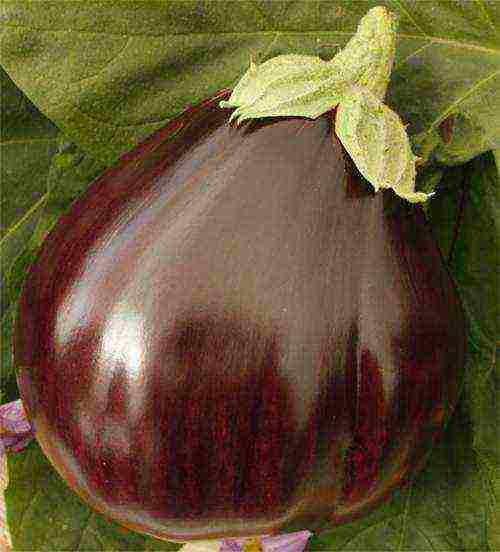
Bull heart eggplants grow up to 450 grams
The Bovine Heart hybrid is one of the eggplants with a high yield and a relatively short ripening period. On strong bushes up to 70 cm tall, fruits grow up to 300 grams in weight. The eggplant pulp has no bitterness at all.
Overview of regional varieties
Russians living in different regions of the country have to grow vegetables in completely different climatic conditions. This is also evidenced by the map of plant frost resistance, on which zones are highlighted where the minimum temperatures are consistently observed.

Frost resistance zones in Russia
Focusing on such a zoning of the territory, you can pick up eggplant varieties for a specific region, which are successfully grown in the open field.
Eggplants in the heart of Russia
In central Russia, in the Moscow region, eggplants are grown either in greenhouses or in open ground, but on sheltered beds. Varieties in these regions are preferable early ripening, the harvest from which they begin to harvest 90–120 days after transplanting.
Note. Since plants have to be covered in the beds, eggplant varieties for central Russia should be chosen with low bushes.
Based on the recommendations of practicing gardeners, the Delikates 163 * variety can be recommended. He belongs to the early ripening, and he did not come out in height - no more than 40 cm. But this eggplant is not afraid of a spider mite, is not subject to wilting, and bears fruit for a long time and abundantly. The fruits are small, the largest among them weigh 100 g, the pulp is white, tasty, without bitterness. Eggplant is ideal for home canning, freezing, and cooking.
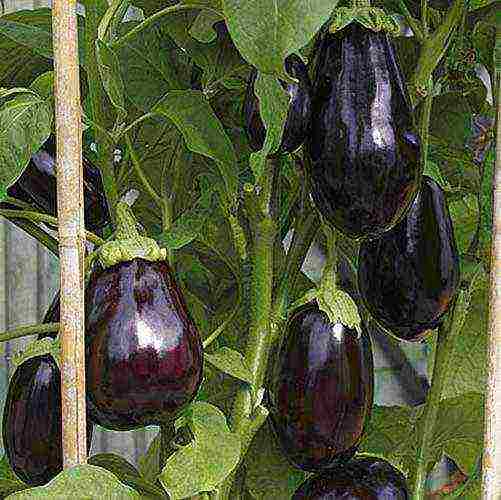
Eggplant variety Delicacy 163 refers to early ripening
Early dwarf * - a variety of early maturing eggplants, harvesting begins after planting seedlings on day 85. The bushes of this plant do not grow higher than 45 cm. Small fruits up to 200 g in weight ripen together, so it is possible to harvest a decent harvest. The fruits of the early dwarf eggplant are nutritious and pleasant to the taste; the variety is considered a table variety.
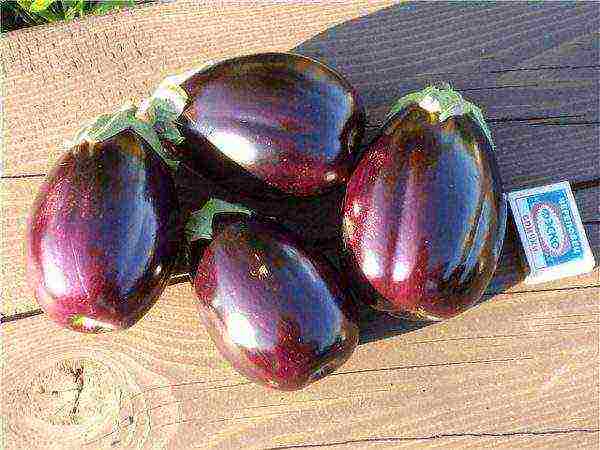
Eggplant bushes of the Dwarf early variety are quite compact
Variety Czech early * - one of the favorites of our gardeners. Compact eggplant bushes are up to 60 cm high. Black-purple fruits with dense, greenish pulp without bitterness gain weight up to 600 grams. Up to 5 kilograms of harvest are removed from a square meter of a garden bed (4–6 bushes). Early Czech is used for home preservation and cooking.
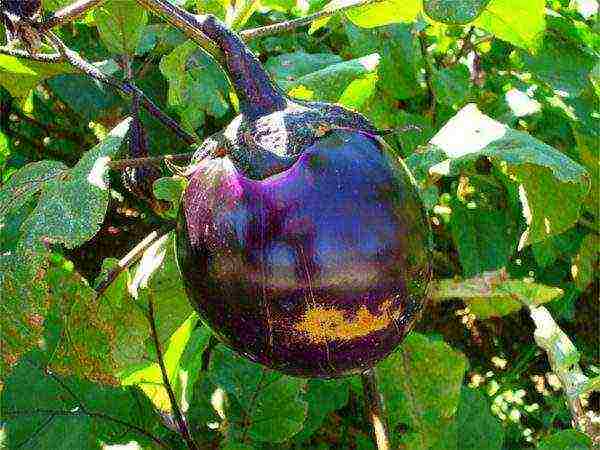
Eggplant fruits of the Czech Early variety are egg-shaped and large in size.
Ural eggplants
Since in the Ural region only a short growing season is available to plants, only a few gardeners with extensive practical experience take on the cultivation of eggplants in unprotected soil. In order for the eggplants to grow and give a harvest, in the Urals one has to choose from varieties with an early and medium ripening period. To the traditionally loved by all gardeners eggplants Almaz, Alekseevsky and Robin Hood, Black Beauty, Lilac Mist, Black Moon who recently settled in garden beds, you can add a few more early and mid-season varieties and hybrids. In general, their list is quite wide, so the choice remains with the gardener.
One of the newest early-ripening varieties Balagur, after full sprouting, will have time to give the first harvest already on the 85-100th day. Its fruits are medium-sized, weighing up to 100 grams, collected in clusters of 3–7 pieces. Eggplants have a dense white flesh. Balagur is not susceptible to the tobacco mosaic virus and flower fall.
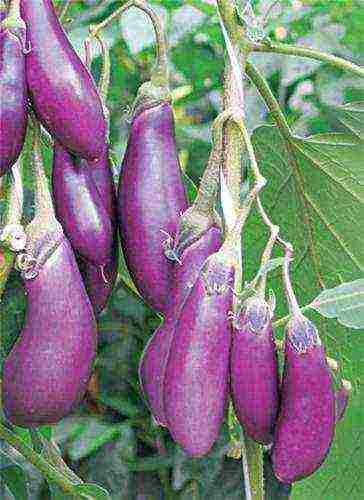
Eggplant variety Balagur is not susceptible to tobacco mosaic virus and flower fall
Don Quixote is an early ripe eggplant variety that grows on sparse bushes about 60 cm high. Fruits are solid - weighing 450 grams. There are few seeds in the pulp. Don Quixote's very good taste is preserved during culinary processing.
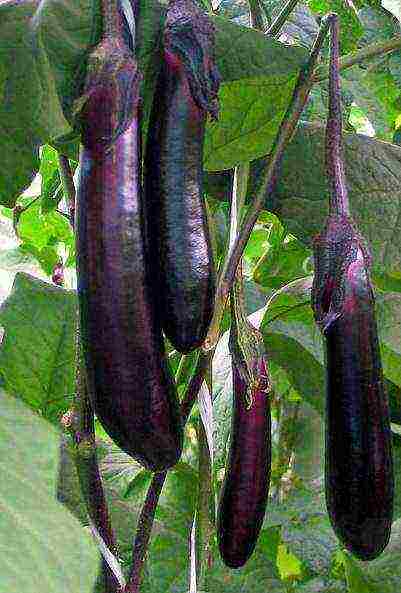
Don Quixote eggplants are saber-shaped
The mid-early variety Maria can be grown in garden beds and greenhouses. It easily tolerates temperature changes and has excellent resistance to diseases typical of nightshades. The bushes of these eggplants do not exceed 70 cm. Fruits can be up to 230 g. The yield from one square meter is up to 8 kg.
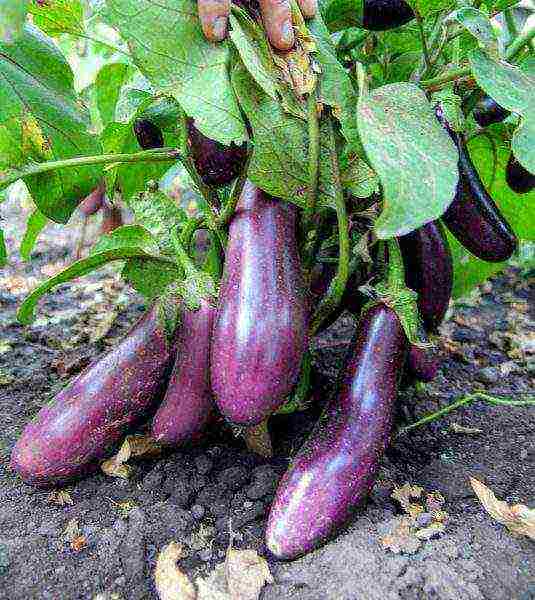
The eggplant variety Maria belongs to the high-yielding
Eggplants of Ukraine
In Ukraine, the temperature gap between different zones of plant winter hardiness is not so great.
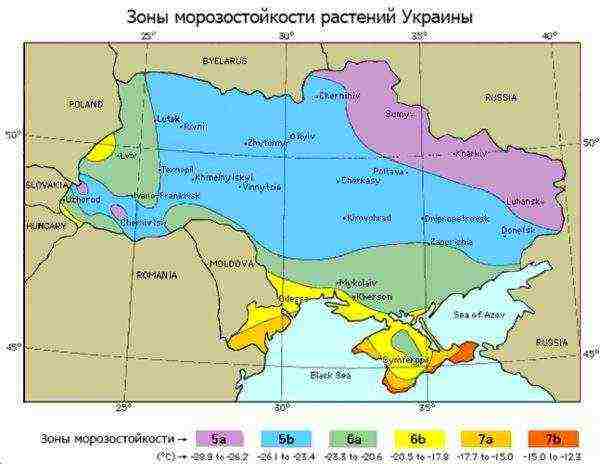
Frost resistance zones in Ukraine
Individual gardeners grow this vegetable throughout Ukraine, and in the south of the country, eggplant cultivation is widespread both on private farms and on an industrial scale. In recent years, the area of distribution of heat-demanding plants has expanded, which makes it possible for a greater number of vegetable growers to grow eggplant of the most productive varieties for open ground.
Among the popular varieties in Ukraine, the Almaz variety remains, of the newer ones - Black Beauty, Vera, Bibo. Of those varieties that have recently appeared on Ukrainian garden beds, you can increasingly find the hybrid variety Clorinda. This is an eggplant with a medium ripening period with a long fruiting period and high-quality fruits, the largest of which grow up to 1500 g. The plant perfectly tolerates a significant drop in temperature. On a bush that grows up to a meter, 6–8 dark purple eggplants are tied. The Clorinda variety has white fruit pulp, which does not darken in the section, and has practically no seeds.
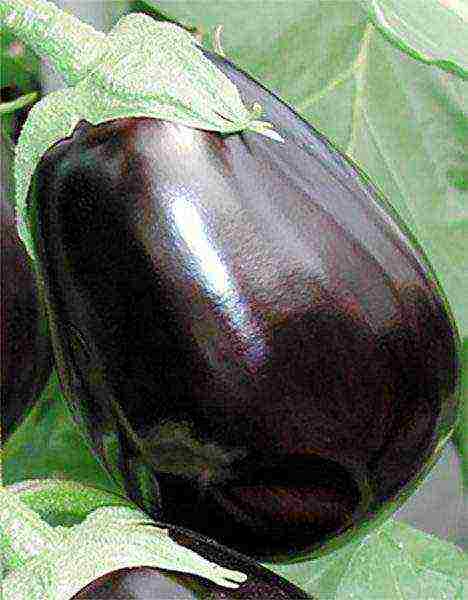
Clorinda eggplants tolerate significant drops in temperature
Premier * is another of the high-yielding varieties created by our breeders. These eggplants are grown both indoors and outdoors. He ripens early - from the time of germination to the beginning of harvesting 105-112 days. Beautiful purple fruits have time to gain weight up to 400 grams. The pulp of the Premier eggplant is dense, white, not bitter, very tasty.
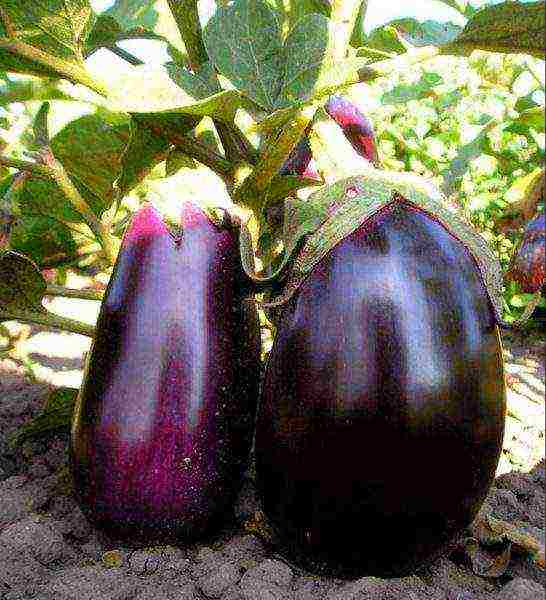
Premier eggplants grow well both indoors and outdoors
Varieties for Belarus
Eggplants in Belarus are grown throughout the country, but not every gardener decides to grow blue ones here in an open garden. After all, the climate of this region is absolutely opposite to the requirements that eggplant needs for normal growth and development. Here the climate is cool, strong winds, in summer there are frequent sudden changes in temperature, prolonged rains and droughts are not uncommon. Therefore, gardeners give preference to growing eggplants in greenhouses, where it is easier to protect them from the negative effects of the weather. At the same time, a variety of varieties are successfully used. Those of the vegetable growers who nevertheless undertake to grow blue ones in the garden prefer the most early ripening varieties and use a film shelter.
Among those recommended in Belarus for growing in open ground is such a variety as Giselle. It is a hybrid suitable for greenhouses and open field. He tolerates a cold snap well. Fruits grow up to 300 g and even half a kilogram, tasty, perfectly stored. The yield is different depending on the growing conditions. The indicator of 9 kg per 1 m2, indicated on the seeds when sold in the retail network, is achieved in spring-summer greenhouses, but not in open ground.
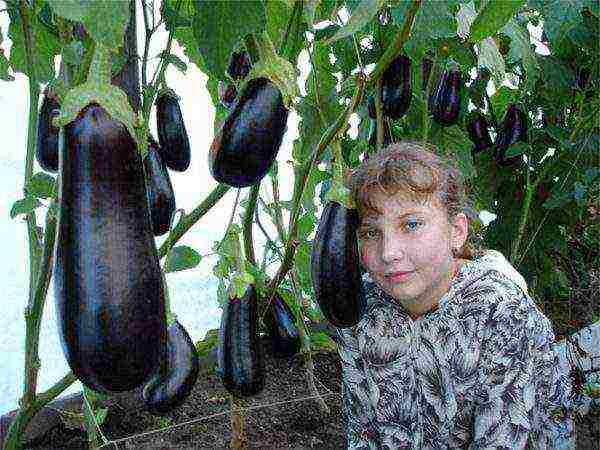
Giselle eggplants are recommended for greenhouses and open ground
Ilya Muromets is a mid-ripening variety, fruiting begins at 110-115 days after germination, and medium-sized - up to 70-100 cm. Massive eggplants of this variety sometimes grow not only 500 grams. Some specimens reach 700 grams. Their very light creamy pulp has absolutely no bitterness, very tasty.Even the largest eggplant of this variety has practically no seed nest.
In the conditions of Belarus, the cultivation of Ilya Muromets in the open field is recommended for the southern regions.
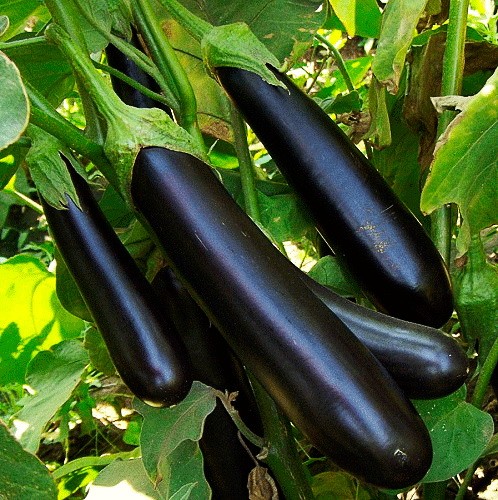
In Belarus, the cultivation of eggplants of the Ilya Muromets variety in the open field is recommended for the southern regions
Eggplants of the medium early variety Universal 6 are adapted to various weather and climatic conditions, are not susceptible to diseases typical of nightshade, and can be grown in beds without shelter. The first crop begins to be harvested 125–130 days after the emergence of seedlings. Eggplants Universal 6 have a dark purple skin, weighing up to 125-175 grams. Their yellowish flesh is not bitter, tender, nutritious and tasty. Eggplants Universal 6 can be kept fresh for a long time.
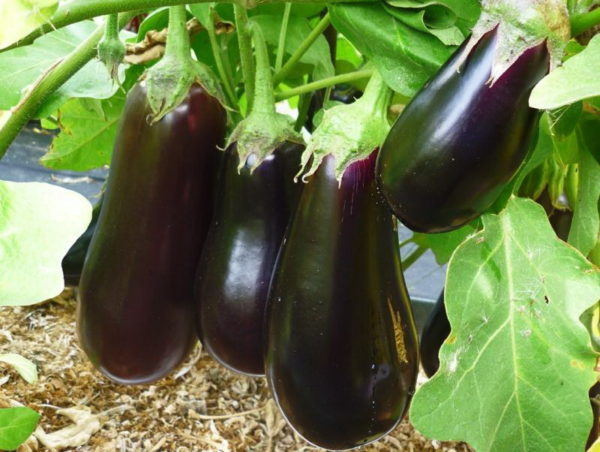
Eggplant variety Universal 6 is adapted to various weather and climatic conditions, is not susceptible to diseases typical of nightshade
Reviews of summer residents
Although eggplant is picky, thanks to the work of breeders, it can be grown in the most seemingly unsuitable regions for it. True, in order for him to grow up in the garden, a lot of work and knowledge must be applied. I would like to hope that the article will be useful to those who choose the best variety of eggplant for their garden.
I work as a copywriter. I love flowers and generally work on the ground, forest, fishing and my permanent computer.
The best varieties of eggplant for open ground
buy eggplant seeds
Eggplant, or, in a popular way, blue, from the same botanical family as tomatoes and potatoes. Family these are nightshades. There are five subspecies of eggplant: East Asian, West Asian, South Asian, semi-cultivated and wild. The first two subspecies are widespread within our country, and all the zoned varieties belong to the West Asian subspecies. Eggplant mastered by people from antiquity. It comes from India, where it was known in culture as early as the 1st millennium BC. Then Japan and China get acquainted with the vegetable, and later Afghanistan, Iran, Turkestan. In the XIII century, eggplant gets to the southern countries of Europe (Italy, Spain, France, then to Bulgaria). It has been known in Russia since the 17th century. Today his grow on South in the open ground and central districts countries in the protected.
eggplant variety Helios Medium early variety. The growing season from germination to technical ripeness is 95-120 days. Vigorous bush, 70-100cm high. Fruits are large, oval in shape, in biological ripeness of red-violet color, weighing 200-300g. The pulp is firm, creamy, tender and tasty. It is recommended to grow eggplant through seedlings. The fruits are used for conservation, processing and home cooking.
grade of eggplant Diamond Mid-season grade of eggplant. From germination to technical ripeness 119-130 days. The fruit is cylindrical, 15-20 cm long, the average weight of the fruit is 140-400 g. The flesh is greenish without bitterness. Almaz variety is very easy to keep, transportable. Average yield 4 kg / m2
eggplant variety Vera Early maturing eggplant variety for open ground and film shelters. The period from germination to technical ripeness is 110-115 days. The plant is low, spreading. The bush is compact, 70-75 cm high. Fruits are pear-shaped, bright purple in color, thick. The mass of one eggplant at full maturity is from 150 gr. up to 200 gr. The pulp is pale yellow, very tender, not bitter. Suitable for long-term storage. Productivity 8-10 kg / m2 Eggplant seed variety is resistant to various types of diseases.
Eggplant variety Donetsk fruitful Early maturing, the growing season from mass shoots to the first harvest is 120 days. The bush is compact, 38-47 cm high. Fruits are cylindrical, dark purple, brownish-brown in a state of biological ripeness. The surface of the fruit is shiny, smooth, with an average weight of 124-135g. The pulp is of medium density, without bitterness. The taste of the fruit is high. The keeping quality and transportability are excellent.In addition to open ground, they are successfully grown in spring greenhouses.
eggplant variety Black handsome Mid-season eggplant variety "Black handsome" for open ground and film shelters. The ripening period from germination to harvest is from 105 to 150 days. The plant is tall, spreading. Fruits are dark purple with a brown tint, small, thick. The mass of one eggplant at full maturity is from 150 gr. up to 200 gr. The pulp is pale yellow, very tender, not bitter. Suitable for long-term storage. The eggplant seed variety is resistant to various types of disease. Eggplants are widely used in cooking: they are convenient for baking, canning, etc.
eggplant variety Mileda F1 Syngenta
An early hybrid of eggplant. The term of maturation is 75 days. The cells are strong, have mesos of medium length and dark green leaves, run without thorns. Fruits are elongated-cylindrical, shiny, purple-violet, longer than 20 cm. Creamy white pulp. Thanks to the pathenocapia, it binds fruits well in cold conditions. Copt is intended for growing both under the film and in the open groove. The seed has been processed. Do not use for food. Store in a dry, cool place.
However, the sowing area under eggplant small. We love eggplant primarily for the abundance of nutrients it contains. Here is sugar, and tannins, and pectin, and fiber, and protein. Almost a third of the periodic table. Fruit color eggplant due to the presence of delphinidin and its derivatives in them. Domestic eggplant varieties medium height or tall (up to 150 cm). Stems are erect, sometimes spreading, shoots are relatively thick, sometimes purple color, leaves from green of varying intensity to purple colors. Eggplant has a powerful root system penetrating to a depth of 1.5 m. The flowers are usually single or collected in small clusters, drooping, the corolla is purple. The flowers are bisexual, the pollen is heavy, carried by the wind no more than 1 m. Eggplant is fertilized mainly by self-pollination. The fruit is a berry of various shapes: from flattened, spherical, pear-shaped; cylindrical of various sizes and weights (up to 500 g). Fruit color eggplant the most varied from white, green to purple, brownish-purple or dark purple, almost black. Seeds are small, flat, grayish-yellow, remain viable for an average of 3-6 years. From 3 to 15 fruits are formed on the plant.
They are baked, tasty and appetizing caviar is made from them, stewed, stews and other dishes are prepared. Moreover, these vegetables can be used to make preparations for the winter. They are popularly called blue. In the same article, varieties of eggplants for open ground will be presented, which are cultivated by many summer residents and farmers. The rating of the best species is compiled according to numerous reviews of vegetable growers.
Eggplant: varieties, photos, description
Early ripening, high-yielding, resistant to fungal and viral diseases, pests, tasty - these are aspects that interest gardeners who want to get a rich eggplant harvest on their site. In this article you can familiarize yourself with photos, descriptions of the best and most popular crops. Here are just a few of them, namely:
- Epic F1 successfully cultivated on the territory of Ukraine and Russia. The first fruits can be harvested within 2 months after planting. The variety is early maturing, in a favorable light stands out with a rich purple hue, excellent taste characteristics, good yield and disease resistance.
- Globular The eggplant variety is ideal for growing in the garden. From the moment the seedlings are planted to the gardener's harvest, about 115 days pass. The average weight of one blue is 250-300 grams. The height of the bush is up to 60 cm, it is highly branching. Excellent yield, transportability and good taste are the main advantages of the variety.
- Albatross - a high-yielding and mid-season type of blue, which is so popular in many regions of the country. Its bush is quite compact, and the weight of the fruit is about 400 grams. From germination to harvesting itself, an average of 120 days pass. The main advantages of Albatross are keeping quality, versatility and impeccable taste without bitterness.
 The photo shows the best varieties of eggplant for open ground
The photo shows the best varieties of eggplant for open ground
However, there are other varieties of eggplant that are in great demand among vegetable growers living in the south, in central Russia, in Ukraine and other regions. Next, we suggest that you familiarize yourself with some of the varieties, their descriptions and photos.
Eggplant Black handsome, reviews, photos
This variety is relatively new, but already popular. It will be possible to collect the first blue ones approximately 140 days after planting the material. To a greater extent, it is planted on their lands and gardens by summer residents and small farmers. As you can see in the photo, the bush is small, but semi-spreading. The fruits are quite elongated, smooth and small (the mass of one vegetable is 200 g).
According to reviews, the peel and blue are thin, and the pulp does not contain any bitterness at all. However, it has other features as well. So, the Black Handsome is used for a wide variety of dishes and homemade products. The plant is resistant to diseases, fruitful and unpretentious, and the excellent taste of the fruit will delight true gourmets. It is often possible to collect up to 7 kg of the fruits of this vegetable from one square meter, thanks to which it can compete with others.
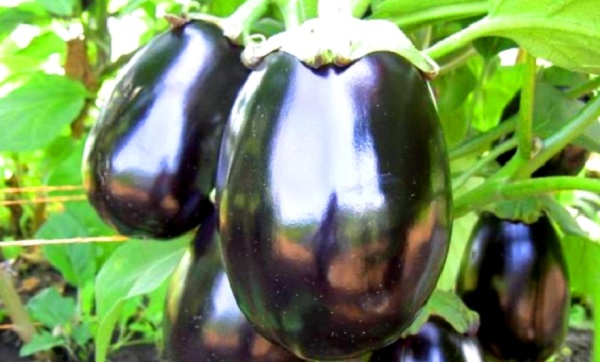 Pictured is an eggplant Black handsome
Pictured is an eggplant Black handsome
Eggplant Japanese dwarf, reviews
The plant received a characteristic name, since in fact it is undersized, but very productive. The spreading bush reaches a height of no more than 40-45 cm, and the weight of one pear-shaped vegetable is about 300 grams. The color of the fruit is deep purple with a glossy sheen. The pulp has a pleasant white shade, firm, and the taste is excellent. The recommended planting scheme is 50x50 cm. About 6 bushes can be placed on 1 square meter, but you should not thicken the planting, as this will adversely affect the yield. The variety is very popular among gardeners, as it is frost-resistant and rather early ripening. Recommended for planting in central Russia and in regions with a cool climate. Eggplant Japanese dwarf can be successfully grown even in summer or winter greenhouses, and the plant begins to bear fruit as early as 2 months after planting seedlings in open ground.
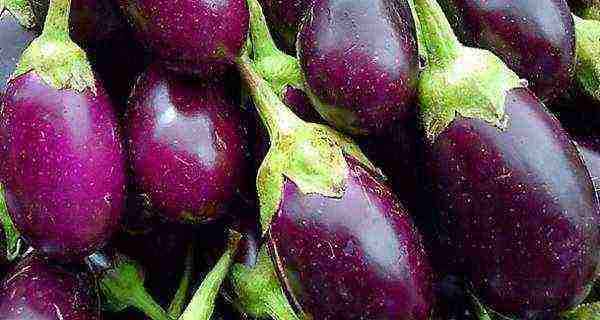 Pictured eggplant Japanese dwarf
Pictured eggplant Japanese dwarf
Eggplant Diamond: variety description, photo
Almaz eggplant is a medium-ripening plant and is intended for cultivation in open ground in the south of the country, and in greenhouses in areas with a predominance of cool weather. The farmer will be able to harvest the first fruits no earlier than after 100-110 days. In cold regions, it may take 10-15 days longer. When grown in northern regions, it is recommended to plant in open ground by seedling method to accelerate fruiting. The Almaz variety tolerates adverse climatic conditions and drought well. The bush grows short and rather compact. The fruits are formed in the form of a cylinder, the average weight is about 150 grams. The pulp has a greenish tint, dense, devoid of a bitter taste. The plant, according to the reviews of vegetable growers, is unpretentious and resistant to fungal diseases. The fruits have excellent keeping quality and retain their excellent presentation during long-term transportation.
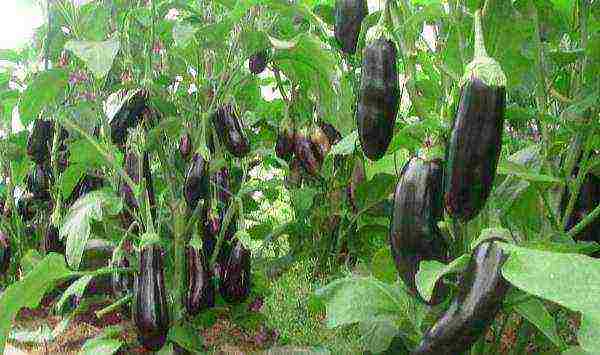 Pictured eggplant diamond
Pictured eggplant diamond
Eggplant Bourgeois: variety description, photo
An early ripe hybrid variety that produces round fruits, which often weigh up to 600 grams. The color of the peel is black and purple. The pulp is firm, not bitter and has a white color. The bush grows to a height of 160 cm, so it is problematic to grow it in a greenhouse and the plant needs to be tied with a trellis method. It is not recommended to thicken the landing. Given the significant spreading of the Bourgeois bush, you should not plant more than 3 plants on 1 square meter of soil. Gardeners recommend growing the variety by the seedling method. For this purpose, at the end of March, the seeds are sown at home after preliminary soaking. Sprouted seeds are planted one at a time in a separate plastic cup and transferred to open ground along with a lump of earth.After 2 months, the seedlings can be transferred to open ground. This should be done when the weather is warm. The soil must be fertilized with organic substances before planting.
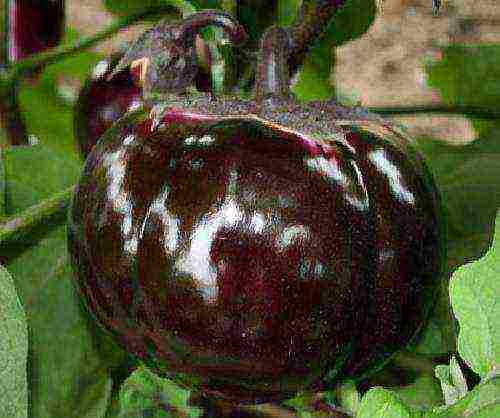 In the photo eggplant Bourgeois
In the photo eggplant Bourgeois
Eggplant Alekseevsky: photo and description
A high-yielding eggplant variety that is in demand among gardeners. The bush has an average spreading, reaches a height of 50-60 cm. Fruits are dark purple in color, cylindrical in shape and have good taste, including canned. The firm flesh is white, without bitterness. Each eggplant weighs 200 grams. It takes about 110-130 days before harvesting. The Alekseevsky variety is resistant to tobacco and cucumber mosaics. Sowing seeds for seedlings begins to be carried out in the last decade of March, and planting a plant in open ground is not earlier than on the 20th of May.
Video about fruitful varieties of eggplant for open ground:
Now you have determined which varieties of eggplant for open ground are best planted in your garden. Undoubtedly, the choice of planting material is a rather important task. Good seedlings, rich yields and tasty fruits await those farm owners who have chosen high-yielding and early maturing varieties with disease resistance.

